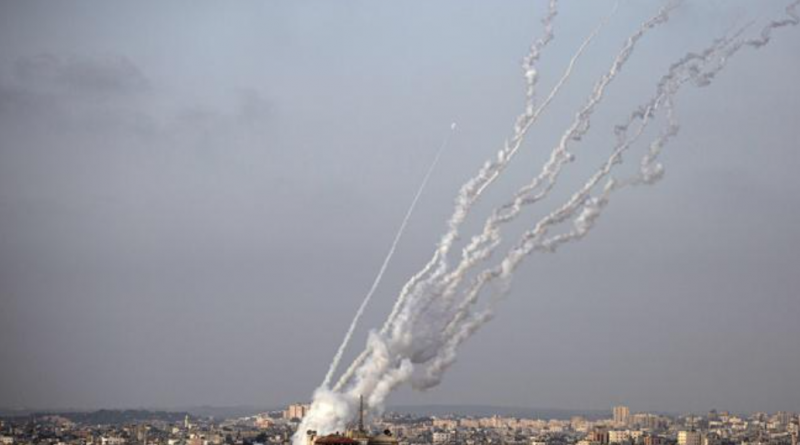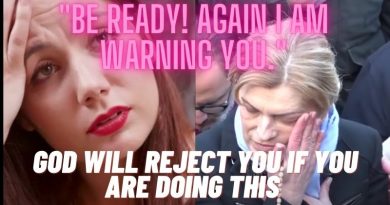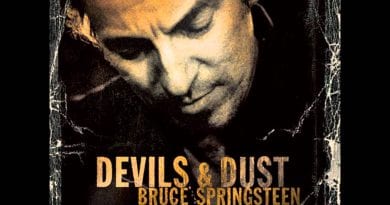SIGNS – SIRENS, EXPLOSIONS, JERUSALEM
JERUSALEM (AP) — Israeli Prime Minister Benjamin Netanyahu has accused the Hamas militant group of crossing a “red line” with its rocket attack on Jerusalem and promised a tough response.
“We will not tolerate an attack on our territory, in our capital, on our citizens and soldiers. Whoever attacks us will pay a heavy price,” Netanyahu said Monday.
With Israel carrying out airstrikes in Gaza and militants bombarding southern Israel with rocket fire throughout the evening, Netanyahu warned that the fighting could “continue for a while.”
THIS IS A BREAKING NEWS UPDATE. AP’s earlier story is below:
Hamas militants fired dozens of rockets into Israel on Monday, including a barrage that set off air raid sirens as far away as Jerusalem, after hundreds of Palestinians were hurt in clashes with Israeli police at a flashpoint religious site in the contested holy city.
The early evening attack on Jerusalem drastically escalated the already heightened tensions throughout the region following weeks of confrontations between Israeli police and Palestinian protesters that have threatened to become a wider conflict.
The Israeli military responded with airstrikes in Gaza that killed at least one person, and officials warned of an open-ended operation against the territory’s Hamas militant rulers.
“We see this as a very severe attack on Israel, an attack that will not go unanswered,” said Lt. Col. Jonathan Conricus, a military spokesman. “Hamas bears full responsibility,” he added, saying Israel planned to deliver a ”severe blow.”
Conricus said a total of 50 rockets were fired into Israel, including six that were aimed at Jerusalem, some 100 kilometers (60 miles) away. It was believed to be the first rocket attack on the city since a 2014 war.
Shortly after the sirens sounded, explosions could be heard in Jerusalem. One rocket fell on the western outskirts of the city, lightly damaging a home and causing a brush fire. The Israeli army said one rocket was intercepted and the others fell in open areas. Rocket fire on southern Israel continued throughout the evening.
Gaza health officials said nine people, including three children, were killed in an explosion in the northern Gaza Strip. It was not immediately known if the blast was caused by an Israeli airstrike or errant rocket fire. In a separate blast, Hamas media reported that an Israeli drone strike killed a Palestinian, also in the northern Gaza Strip.
The Israeli army said an Israeli civilian in the country’s south suffered mild injuries when a vehicle was struck by an anti-tank missile from Gaza.
Abu Obeida, spokesman for Hamas’ military wing, said the attack on Jerusalem was a response to what he called Israeli “crimes and aggression” in the city. “This is a message the enemy has to understand well,” he said.
He threatened more attacks if Israeli forces re-enter the sacred Al-Aqsa Mosque compound or carry out planned evictions of Palestinian families from an east Jerusalem neighborhood.
Earlier, Israeli police firing tear gas, stun grenades and rubber bullets clashed with stone-throwing Palestinians at the iconic compound, which is Islam’s third-holiest site and considered Judaism’s holiest. Tensions at the site have been the trigger for prolonged bouts of violence in the past, including the last Palestinian intifada, or uprising. It was not clear if the current unrest would escalate or dissipate in the coming days.
More than a dozen tear gas canisters and stun grenades landed in the mosque as police and protesters faced off inside the walled compound that surrounds it, said an Associated Press photographer at the scene. Smoke rose in front of the mosque and the golden-domed shrine on the site, and rocks littered the nearby plaza. Inside one area of the compound, shoes and debris lay scattered over ornate carpets.
More than 300 Palestinians were hurt, including 228 who went to hospitals and clinics for treatment, according to the Palestinian Red Crescent. Seven of the injured were in serious condition. Police said 21 officers were hurt, including three who were hospitalized. Israeli paramedics said seven Israeli civilians were also hurt.
In an apparent attempt to avoid further confrontation, Israeli authorities changed the planned route of a march by ultra-nationalist Jews through the Muslim Quarter of the Old City to mark Jerusalem Day, which celebrates Israel’s capture of east Jerusalem.
Monday’s confrontation was the latest after weeks of almost nightly clashes between Palestinians and Israeli troops in the Old City of Jerusalem, the emotional center of their conflict, during the Muslim holy month of Ramadan. The month tends to be a time of heightened religious sensitivities.
Most recently, the tensions have been fueled by the planned eviction of dozens of Palestinians from the Sheikh Jarrah neighborhood of east Jerusalem, where Israeli settlers have waged a lengthy legal battle to take over properties.
Israel’s Supreme Court postponed a key ruling Monday in the case, citing the “circumstances.”
Over the past few days, hundreds of Palestinians and several dozen police officers have been hurt in clashes in and around the Old City, including the sacred compound, which is known to Jews as the Temple Mount and to Muslims as the Noble Sanctuary.
The tensions in Jerusalem have threatened to reverberate throughout the region and come at a crucial point in Israel’s political crisis after longtime leader Prime Minister Benjamin Netanyahu failed to form a governing coalition last week. His opponents are now working to build an alternate government.
Before Monday’s rocket attack on Jerusalem, Palestinian militants had fired several barrages of rockets into southern Israel. Protesters allied with Hamas have launched dozens of incendiary balloons into Israel, setting off fires across the southern part of the country.
The rare strike on Jerusalem came moments after Hamas had set a deadline for Israel to remove its forces from the mosque compound and Sheikh Jarrah and release Palestinians detained in the latest clashes.





